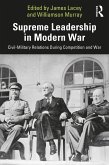They are two of twentieth-century history's most significant figures, yet today they are largely forgotten - Paul von Hindenburg and Erich Ludendorff, Germany's First World War leaders. Although defeat in 1918 brought an end to their 'silent dictatorship', both generals played a key role in the turbulent politics of the Weimar Republic and the rise of the Nazis. Alexander Clifford, in this perceptive reassessment of their political careers, questions the popular image of these generals in the English-speaking world as honourable 'Good Germans'. For they were intensely political men, whose ideas and actions shaped the new Germany and ultimately led to Hitler's dictatorship. Their poisonous wartime legacy was the infamous stab-in-the-back myth. According to the generals, the true cause of the disastrous defeat in the First World War was the betrayal of the army by politicians, leftists and Jews on the home front. This toxic conspiracy theory polluted Weimar politics and has been labelled the beginning of 'the twisted road to Auschwitz'. Hindenburg and Ludendorff's political fortunes after the war were markedly different. Ludendorff inhabited the far-right fringes and engaged in plots, assassinations and conspiracies, playing a leading role in failed uprisings such as Hitler's 1923 Beer Hall Putsch. Meanwhile Hindenburg was a vastly more successful politician, winning two presidential elections and serving as head of state for nine years. Arguably he bore even more responsibility for the destruction of democracy, for he and the nationalist right he led sought, through Hitler, to remould the Weimar system towards authoritarianism.
Dieser Download kann aus rechtlichen Gründen nur mit Rechnungsadresse in A, B, BG, CY, CZ, D, DK, EW, E, FIN, F, GR, HR, H, IRL, I, LT, L, LR, M, NL, PL, P, R, S, SLO, SK ausgeliefert werden.









